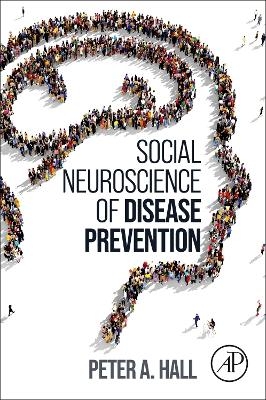
Social Neuroscience of Disease Prevention
Academic Press Inc (Verlag)
978-0-12-823463-1 (ISBN)
- Noch nicht erschienen (ca. Dezember 2024)
- Versandkostenfrei innerhalb Deutschlands
- Auch auf Rechnung
- Verfügbarkeit in der Filiale vor Ort prüfen
- Artikel merken
Peter Hall is a Full Professor in the School of Public Health & Health Systems at the University of Waterloo. His research aims to identify causal determinants of health-related behaviors, visceral states, and cognitions using methods from cognitive neuroscience, social psychology and public health. Of specific interest are: 1) reciprocal relationships between lifestyle factors and brain health, 2) transcranial magnetic stimulation (rTMS), and 3) brain imaging in population health.
1. Strategy of Preventive Medicine
2. Brain Health
3. Neuroscience of Health Communication
4. Neurobiology of Health Behavior Change
5. Exercise Neuroscience
6. Eating and the Human Brain
7. The Brain on Drugs and Drugs on the Brain
8. Stress and Resilience in the Human Brain
9. Developmental Influences on Brain Health
10. Socioeconomic Forces and Brain Development
11. Early Adversity and the Developing Brain
12. Enivornmental Toxins, Public Policy and the BrainStrategy of Preventive Medicine
13. Brain Health
14. Neuroscience of Health Communication
15. Neurobiology of Health Behavior Change
16. Exercise Neuroscience
17. Eating and the Human Brain
18. The Brain on Drugs and Drugs on the Brain
19. Stress and Resilience in the Human Brain
20. Developmental Influences on Brain Health
21. Socioeconomic Forces and Brain Development
22. Early Adversity and the Developing Brain
23. Enivornmental Toxins, Public Policy and the Brain
| Erscheint lt. Verlag | 1.12.2024 |
|---|---|
| Verlagsort | San Diego |
| Sprache | englisch |
| Maße | 152 x 229 mm |
| Themenwelt | Medizin / Pharmazie ► Medizinische Fachgebiete ► Neurologie |
| Studium ► Querschnittsbereiche ► Prävention / Gesundheitsförderung | |
| Naturwissenschaften ► Biologie ► Humanbiologie | |
| Naturwissenschaften ► Biologie ► Zoologie | |
| ISBN-10 | 0-12-823463-6 / 0128234636 |
| ISBN-13 | 978-0-12-823463-1 / 9780128234631 |
| Zustand | Neuware |
| Haben Sie eine Frage zum Produkt? |
aus dem Bereich


